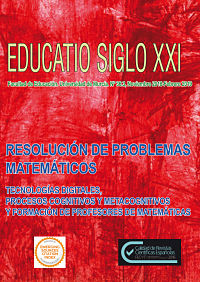Mathematical processes in teaching: analysis of the reliability of an evaluation questionnaire
Abstract
This article presents the results of an internal reliability analysis of a questionnaire designed to evaluate the presence of mathematical processes in the practices used to teach and learn mathematics. After validating the instrument by means of expert judgement in a prior study, 20 expert evaluators administered the instrument to 95 teachers of preschool and primary education in the Community of Murcia (Spain). The data obtained was analysed with the R-3.1.0 statistical package on an i686-pc-linux-gnu (32-bit) platform. Based on standardised scores, the Cronbach alpha shows a good level of internal consistency (median alpha coefficient .789 for Preschool and .86 for Primary), with the lowest level corresponding to the process of “representation” in preschool, with a value of .74, which is still considered to be an acceptable level of internal consistency.
Downloads
-
Abstract2333
-
PDF (Español (España))1389
References
Baroody, A.J. (1988). El pensamiento matemático de los niños. Madrid: Visor, MEC.
Benavides, M. y Núnez, R. (2007). Matemática y psicomotricidad: la noción de espacio. Revista Iberoamericana de Psicomotricidad y Técnicas Corporales, 25, 7(1), 235-244.
BOE (2007). Orden ECI/3960/2007, de 19 de diciembre, por la que se establece el currículo y se regula la ordenación de la educación infantil. Recuperado de: http://www.boe.es/boe/dias/2008/01/05/pdfs/A01016-01036.pdf
BOE (2014). Real Decreto 126/2014, de 28 de febrero, por el que se establece el currículo básico de la Educación Primaria. BOE (2014), nº 52, 14, 19349-19420.
Carpenter, T.P. y Levi, L. (1999). Developing conceptions of algebraic reasoning in the primary grades. Madison: University of Wisconsin-Madison.
Coronata, C. (2014). Presencia de los procesos matemáticos en la enseñanza del número de 4 a 8 años. Transición entre la Educación Infantil y Elemental. Tesis doctoral. Girona: Universidad de Girona. Recuperado de: http://dugi-doc.udg.edu/handle/10256/9750
De Guzmán, M. (2001). Tendencias actuales de la educación matemática. Sigma, 19, 5-25.
Edo, M. (2008). Matemáticas y arte en educación infantil. UNO. Revista de Didáctica de las Matemáticas, 47, 37-53.
George, D. y Mallery, P. (2006). Spss for Windows step by step: A Simple Guide and Reference. 13.0 Update (6ª ed.). Boston: Pearson Education, Inc.
Llinares, S. (2008). Agendas de investigación en Educación Matemática en España. Una aproximación desde “ISI-web of knowledge” y ERIH. En R. Luengo, B.Gómez, M. Camacho y L. Blanco (Eds), Investigación en educación Matemática XII (pp. 25-54). Badajoz: SEIEM.
Martínez, C. (2001). La resolució de problemes en les primeres edats. Biaix, 18, 9-12.
NAEYC y NCTM (2002). Early childhood mathematics: Promoting good beginnings. A joint position statement. Recuperado de: http://www.naeyc.org/files/naeyc/file/positions/psmath.pdf
NCTM (2000). Principles and standards for school mathematics. Reston, Va.: The National Council of Teachers of Mathematics
Niss, M. (2002). Mathematical competencies and the learning of mathematics: the Danish Kom Project. Roskilde: Roskilde University.
OECD (2004). Learning for tomorrow's world: First results from PISA 2003. Paris: OECD.
OECD (2006). Assessing scientific, reading and mathematical literacy: A framework from PISA 2006. París: OECD.
OECD (2007). PISA 2006 Science competence for tomorrow's world. Paris: OECD.
Planas, N. (2005). El papel del discurso en la construcción del Discurso de la práctica matemática. Cultura y Educación, 17(1), 19-34.
Puig, L. (1996). Elementos de resolución de problemas. Granada: Comares.
R Core Team (2014). R: A language and environment for statistical computing. Viena: R Foundation for Statistical Computing. Recuperado de: http://www.R-project.org.
Revelle, W. (2015). Psych: Procedures for Personality and Psychological Research. Evanston, Illinois: Northwestern University. Recuperado de: http://CRAN.R-project.org/package=psych Version = 1.5.1.
Romero, S. y Castro, F. (2008). Modelización matemática en secundaria desde un punto de vista superior: EL PROBLEMA DE DOBOGÓKÓ. Modelling in Science Education and Learning, 1(2), 11-23.
Saá, M.D. (2002). Las matemáticas de los cuentos y las canciones. Madrid: Editorial Eos.
Sullivan, P. y Lilburn, P. (2002). Good questions for Math Teaching. Australia: Oxford University Press.
Original work publishes in this journal is subject to the following terms:
1. Murcia University Press (the publishing house) holds the copyright of the publishes work, and favours and allows their reutilization under the use license stated in point 2.
© Servicio de Publicaciones, Universidad de Murcia, 2015
2. Work is published in the electronic edition under a license (Creative Commons Reconocimiento-NoComercial-SinObraDerivada 4.0 España (legal text). They can be copied, used, disseminated, transmitted and publicly presented, as long as: i) authorship and original publication source is acknowledged (journal, publishing house and URL of the work); ii) are not used for commercial purposes; iii) the existence and specifications of this use license is stated.
3. Conditions for self-archive. Authors are allowed and encouraged to disseminate electronically the pre-pint (before review) and/or post-print (accepted for publication) versions of their work before their publication since that favours earlier circulation and dissemination resulting in an increased chance for the authors to be cited and for the work to reach a bigger share of the academic community. Colour: RoMEO: green.







